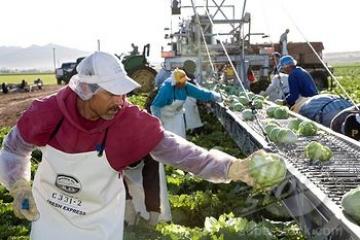Remigration: Arizona's agricultural workforce dilemma

 Two factors are converging to create a farming crisis in Arizona: one has its origins in domestic policy – hard-line immigration laws which have been harped on endlessly by the press – while the other factor has its roots planted in foreign soil, growing in step with an economy that is outpacing our own.
Two factors are converging to create a farming crisis in Arizona: one has its origins in domestic policy – hard-line immigration laws which have been harped on endlessly by the press – while the other factor has its roots planted in foreign soil, growing in step with an economy that is outpacing our own.
It's odd to hear the phrase “labor shortage” tossed around during a time of double-digit jobless rates, but a lack of a reliable work force is exactly what farmers across the Southwest are experiencing. Arizona has been hit especially hard by the flight of undocumented farm workers from the state. Are the Nazi-esque, “papers please” identification requirements of SB 1070 or the E-Verify mandates placed upon state employers the catalyst for mass “remigration,” or are these policies helping to drive an exodus that already had considerable momentum?
In a piece titled, “A Shortage of Mexican Laborers Threatens Arizona Farming,” Phoenix New Times author Monica Alonzo explores this question, quoting Arizona Farm Bureau lobbyist Joe Sigg as saying, “even before these laws started to pop up, we were seeing a shortage of workers.” The Public Policy Institute of California has quantified Arizona's agricultural labor-loss in a recent study. From 2008 to 2009, some 92,000 illegal workers either fled the state or sought self-employment as a result of the Legal Arizona Workers Act, which forces employers to check the legal status of employees against a federal database. That was a 17 percent reduction in Arizona's working-age population of unauthorized immigrants.
But those migrants didn't seek greener pastures in California, which is unaffected by any onerous immigration laws. In fact, the Golden State has lost over 300,000 undocumented immigrants over the past three years say PPIC researchers.
The construction industry drew a great number of undocumented workers from Mexico during the height of the housing bubble. Many of these workers had homes or businesses in Mexico that they left to work seasonally here in the states. After the bottom fell out of housing, most of these workers turned to agriculture to make ends meet only to find lower wages and an increasingly hard time receiving medical and government assistance. The majority have been forced to weigh the costs of renting in America against the benefits of permanently returning home to what Sacramento's Mexican consul general Carlos González Gutiérrez has dubbed a “middle-class country.”
Mexico's economy is growing 4 to 5 percent a year as its birthrate is declining steeply, a sign that its society is transforming from a rural to an urban one, says the consul in this Sacramento Bee article. Gutiérrez adds that the consequence of its 4.9 percent unemployment rate and its improving economic conditions is that Mexico is “running out of Mexicans to export.” Mexico's growing middle class “reduces the appetites to come because there are simply many more options at home,” says Gutiérrez.
For some, the debate over exactly why the ag labor force is dwindling is a red herring with little impact on saving the state's $10.3 billion a year agricultural sector.
“Our industry doesn't have an immigration problem, we have a labor problem. It's going to continue to grow and get greater in the future," says Sigg.
Indeed, if America's economy continues to stagnate in the doldrums while Mexico (thanks to strong exports, low inflation and a "strong banking system") continues its ascendency through to the top-tier of the United Nations' standard of living index, Arizona can forget about trying to prop up an industry built on low-wage, illegal labor. Instead, it will have to figure out how to attract some of the 14 million unemployed documented workers in America to pitch its watermelons and harvest its tomatoes if it wants to compete with Mexico's booming agricultural economy in the years to come.




